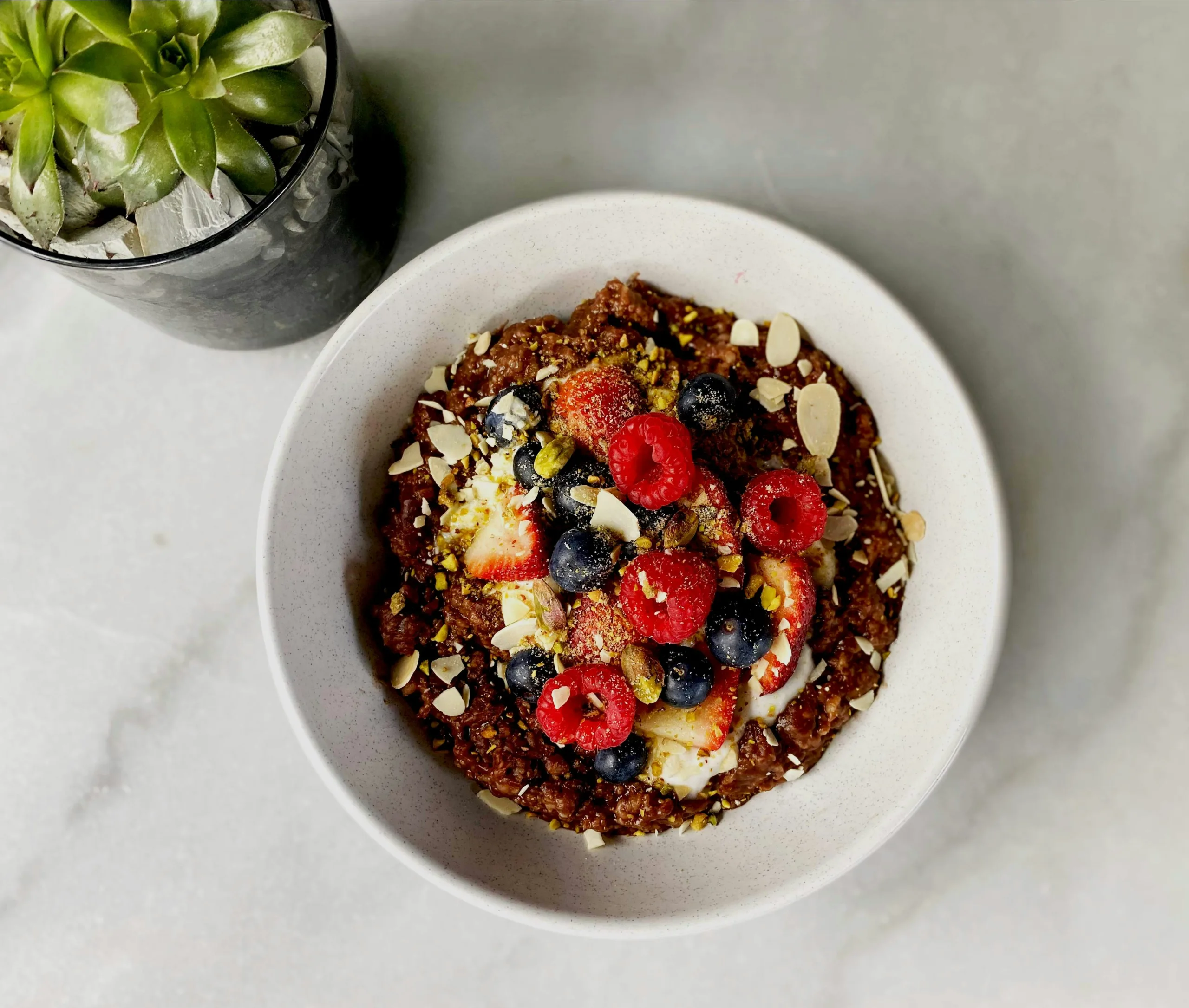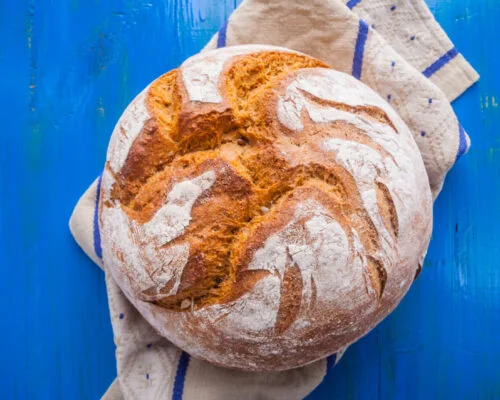Bone broth is a trendy health elixir you’ve likely heard all about for its collagen-boosting qualities (among other things), but did you know there are other foods that boost collagen (in case “beef” is not your favorite beverage flavor)?
Here’s why it matters: Collagen is a protein in the body that makes up joint-supporting connective tissues, is responsible for skin elasticity (AKA wrinkle defender), and helps maintain the lining of the digestive tract. In other words, it’s really important.
RELATED: 8 Food Tips for Glowing Skin
The body makes collagen on its own, but production slows down as you get older (no surprise there), so getting some in your diet is a good idea to make up for a potential deficit.
The problem is that it’s really only found in animal tissue and bones, hence the popularity of bone broth. Bone broth, however, though easier and easier to find these days, is pricey, and making it at home requires … well … bones. Not to mention hours (upon hours!) of simmering.
RELATED: 3 Basic Broth Recipes
What is Collagen?
Collagen is the most abundant protein in your body, accounting for about one-third of your protein makeup. While that’s impressive, what’s really impressive is how big of a role collagen plays in your health and well-being. As we said, collagen is responsible for everything from a healthy gut, to glowing skin, to smooth-moving joints.
Read on to find out more about the benefits of collagen.
Benefits of Collagen
Rich in amino acids: Made from amino acids, the building blocks of protein, collagen is particularly rich in proline and glycine and acts as the glue that holds parts of your body together, such as working to keep the lining of your intestinal tract strong and healthy.
Used to make connective tissue: Collagen’s fiber-like structure is used to make your body’s connective tissue. In other words, it helps you maintain and repair healthy bones, skin, muscles, tendons, cartilage, joints and ligaments.
Helps with skin and hair health: While collagen is currently trending in popularity, it’s been around for decades as a cosmetic filler, helping to plump the skin through injectables. So it makes sense that the popularity of ingesting collagen has also taken the beauty industry by storm. But do these beauty products work?
One review of 11 studies found that women taking 3-10 grams of collagen per day for an average of 69 days led to improvements in hydration and skin elasticity. Since collagen makes up 70% of your dermis, the middle layer of skin that your hair grows out of, low collagen may also reduce hair growth and lead to thinning hair. So collagen supplementation can have the opposite effect, helping hair grow and reduce thinning.
Can help boost your metabolism: Collagen helps build muscle mass, which can lead to a super-charged metabolism and healthy weight management.
May prevent bone loss: Collagen supplements may help hinder the bone breakdown which leads to osteoporosis.
Collagen Supplements
In China, collagen has been viewed as the fountain of youth for centuries. Women there have typically eaten things like pig’s feet, shark fins, and donkey hide hoping to smooth skin and lubricate aging joints.Today, there are collagen supplements at every supermarket and drugstore–from capsules to powders to waters, there’s something for everyone with no pig’s feet involved!
If you do choose to buy collagen powder to add to smoothies, just remember that there are conflicting opinions on how much value you get from this method because of the way the body has to break down and rebuild the protein.
For our vegan friends, since collagen is made primarily from animal sources, there are collagen “boosters” to be considered. These have no animal products, but do contain key ingredients—such as vitamin C—that support your body’s collagen production.
If you do choose to supplement, stay away from products that have artificial flavors or sweeteners. Look for powders that have been certified by a third-party quality-testing company and sourced from grass-fed, pasture-raised animals. Also look for hydrolyzed collagen peptide powder, which is collagen that’s been broken down so it’s easy to digest and easily dissolves into warm or cold liquids. Since many high-quality collagen powders are flavorless, you can mix them into everything from coffee and smoothies, to soups, and even baked goods.
Collagen dosing will depend on the type of collagen you’re taking and your reasons for taking it. Be sure to refer to the manufacturer’s packaging and follow their instructions as stated.
10 Foods That Boost Collagen
A 2012 review on nutrition and aging found that fruits and veggies are the safest and healthiest way to boost skin health. Keep reading for the nutrients and foods that contribute to collagen production.
Citrus

Vitamin C plays a major role in collagen synthesis, and citrus fruits (plus broccoli, broccoli rabe, and red peppers!) are filled with it. Vitamin C also acts as an antioxidant, so you get the added benefit of protecting your skin from free radical damage.
(Image: Shutterstock)
Leafy Greens

Citrus may get most of the attention for being high in vitamin C, but leafy greens such as kale are also loaded with the good-for-you antioxidant. Eating your leafy greens is an ideal way to make sure you’re getting enough vitamin C over the course of the day.
(Image: Shutterstock)
Oysters

Oysters are rich in minerals, specifically zinc and copper, both of which activate molecules that are required for collagen synthesis. Bonus: Oysters are one of the most sustainable seafood choices you can make.
(Image: Shutterstock)
Dairy

Milk isn’t just a calcium superstar; it’s also an underrated source of zinc. One cup of milk meets 7% of your daily zinc requirement, and—even better—the body has an especially easy time absorbing the zinc from dairy.
(Image: Shutterstock)
Meat

The protein in meat is made up of essential amino acids the body can’t make on its own. But meats such as beef and chicken also contain non-essential amino acids, some of which make up collagen. Eating meat, then, provides your body with additional stores of the amino acids it needs to produce collagen.
(Image: Shutterstock)
Bone Broth

One of the hottest collagen-boosting picks out there, bone broth is made by simmering animal bones in water. Since the broth is made from, well, bones, and other connective tissue, it contains many nutrients—including amino acids—that may help support collagen production.
(Image: Shutterstock)
Eggs

Not only are the whites of eggs rich in glycine and proline—amino acids necessary for collagen production—the yolks are packed with vitamin D and healthy fats, contributing even more to the health of our skin, bones, and muscles.
(Image: Shutterstock)
Berries

Did you know that ounce for ounce, strawberries actually have more vitamin C than oranges? Adding more of this vital vitamin to your diet through not just citrus fruits but berries supports your body’s ability to produce collagen.
Berries are also high in antioxidants, which help protect the skin from oxidative stress and free radicals.
(Image: Shutterstock)
Garlic

Surprise! Garlic not only makes some of your favorite dishes even yummier, it could boost your collagen production, too. Since it’s high in sulfur, a trace mineral that helps synthesize and prevent the breakdown of collagen, it’s worth working into your meal-prep rotation. The only caveat? It could take a lot of garlic to realize any collagen benefits, so be sure to keep your toothbrush handy.
(Image: Shutterstock)
Beans

Beans are high in protein and feature the amino acids necessary for collagen synthesis. This is great news for our vegan friends who lean on beans as a protein source. Beans are also rich in copper, another nutrient that assists in collagen production.
(Image: Shutterstock)





























